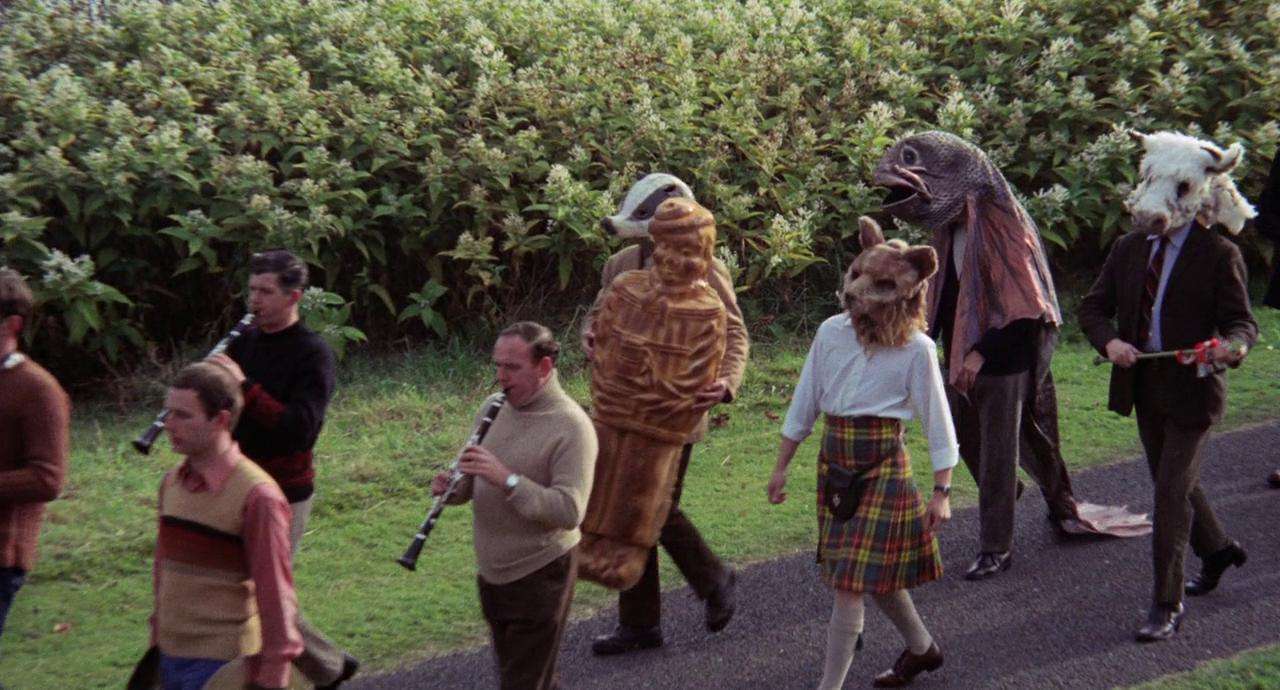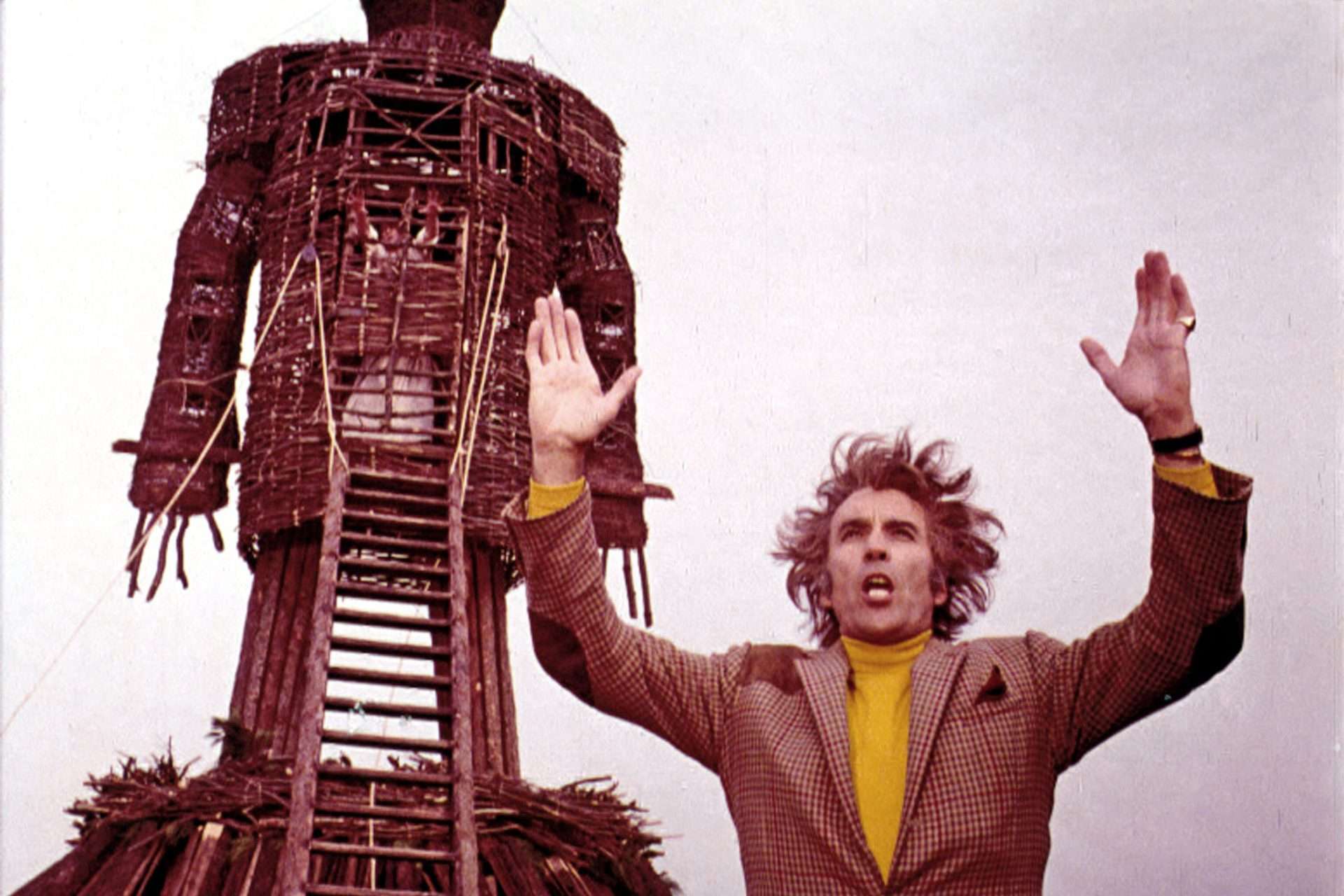Ever since Ari Aster’s deliciously horrifying “Midsommar” forever traumatized us, its OG inspiration, “The Wicker Man,” has also found a new life, or dare I say, “reincarnation.” The 1973 Pagan-themed horror is very much recognized amongst the genre aficionados anyway, and Midsommar’s popularity has only resulted in adding a handful number of members to the cult over the last three years.
I saw the movie many years ago without even having some basic knowledge, thanks to my habit of experiencing movies without having any kind of preconceived notion. A recent re-watch, thanks to this assignment, has, of course, allowed me to process things with far-developed sensibilities, both life and movie-wise.
While at the core, both “The Wicker Man” and “Midsommar” bear pretty much similar tasting fruit, the former has a much more straightforward narrative. That is natural, given it breathed the air back in the seventies, where terms like “toxic relationship” used to be things of a very distant future, let alone infusing it into the narrative and using it as a camouflage.
Unlike today’s horror movies, “The Wicker Man” comes with a much rusty, even brush vibe, which I found a bit difficult to get myself adjusted to. Once that happened, however, I did end up enjoying the hell out of it; and I am probably going to find real “hell” for writing this sentence, just saying.
The Wicker Man (1973) Plot Summary & Movie Synopsis:
Devoted lawman and god-fearing Christian, Sergeant Howie receives an anonymous invitation to this remote Scottish Island, Summerisle, to investigate the disappearance of a local teenager, Rowan Morrison. Upon reaching the Island on his seaplane, and (literally) finding his ground after a bit of hassle from the islander, Howie is surprised to find out that there is no missing teenager named Rowan Morrison.
The only Morrisons on the Island are the Post office lady, May, and her little daughter Myrtle. While May dismisses the existence of any “Rowan,” a cryptic conversation with Myrtle in which she references “Rowan” sows the seed of doubt inside the Sergeant’s mind.
Initial Cultural Shock
Howie soon discovers that the Islanders have adopted a very different religious culture compared to his staunch Christianity. A freewheeling, harmonious community under the inspirational leadership of one certain Lord Summerisle, where children are taught about phallic symbols in the local school and humans copulate right under the sun and stars. Unsurprisingly this comes off as a huge cultural shock for someone like Howie, who gets further teased for his beliefs by his innkeeper Alder MacGregor, and his ravenous daughter Willow.
The Investigation
Despite his religious sentiment getting hurt, Howie continues his investigation like a true lawman. At the Green Man Inn, where he is staying, Howie notices a series of photographs of the Annual Harvest Celebration, with all the photos having one thing in common, featuring a young girl as the “May Queen.”
Howie’s suspicion about the islanders up to no good strengthens further when he realizes that the photograph of the most recent celebration is not there. Sanguine about the fact that Rowan Morrison was the missing “May Queen” from last year, Howie reaches the depressing conclusion that the young girl is no more. But he still has to find the body and needs permission for exhumation from Lord Summerisle.
Who is Lord Summerisle?
We finally meet Lord Summerisle, aka the legendary Christopher Lee, in all his glory. Welcoming Sergeant Howie with his charming but enigmatic presence, Summerisle gives him an insight into the island. It all started with his Grandfather, who found a strain of fruit that could be harvested in Scottish conditions. With their island blooming with fresh crops, the inhabitants embraced the old gods and an alternative, very non-Christian-like lifestyle. The same has been transported from generation to generation.
While Summerisle politely explains all these, Howie fumes with frustration and anger, and we finally hear the P-word from his mouth. Summerisle, however, does not seem to be bothered by it and continues to hold onto his stance as the gracious host. He does not even oppose the exhumation while neither confirming nor denying Rowan Morrison’s demise.
What does Sergeant Howie find in the grave?
This is where things get really dicey. Sergeant Howie does not find a dead Rowan Morrison in the supposed grave. What he finds out is a dead rabbit. A visibly mad Howie rushes over to Summerisle, only to be rebuffed by the Lord’s vague, ludicrous explanation.
Seeing no hope out there, Howie gets back to the inn and searches harder for anything that might show him some light. He does manage to find those missing photographs, where he spots Rowan, who is standing amongst empty boxes, indicating the harvest has failed. It doesn’t take long for Sergeant Howie to connect the dots and realize that Rowan is, in fact, alive, but her days are numbered.
The Wicker Man (1973) Ending, Explained:
Does Rowan Morrison get saved?
With a little more research Howie finds out about the “Human Sacrifice” on the first day of May in years when the harvest has gone wrong. By offering a human to the sun god, the islanders are going to get a year of great harvest. Appalled by the thought of this barbaric practice, Sergeant Howie decides to bring in the law from the mainland to handle the grave matter.
The night before the inauspicious Mayday, Willow performs a seductive dance to arouse Howie indirectly. In the morning, Howie reveals that he is engaged to be married and abstaining from sex until that happens, which makes him a virgin. Without wasting any more time, Sergeant Howie rushes to his Seaplane while the Islanders start their May Day celebration in full swing, donning strange-looking costumes and masks. After boarding his plane, Howie finds out it has been damaged as he fails to start it.
Despite being circumstantially reduced to a “one-man army,” Howie gallantly searches every single house for Rowan Morrison, which does not bear any fruit. Realizing he is not going to find Rowan this way, Howie hatches a plan that effectively makes him infiltrate the cult as Inn-keeper McGregor, which does not seem to be a problem given everyone wearing masks.
Howie’s plan finally works out when he finally sees Rowan Morrison at the beach during the Celebration, wearing the May Queen attire, including the leafy crown. Not caring a bit about his cover getting blown, Howie runs towards Rowan to help her get away from all the madness.
What happens to Sergeant Howie?
The worst possible thing, to be honest. Running with Rowan to find an escape route, Howie comes across Summerisle, Willow, and a few others at the edge of a cliff. Turns out, it was Rowan who had directed him to them. And that is not all; the whole thing was a ruse to get Howie at this point.
A man of the king status as he is a lawman, of his own free will as all of it was his own choice albeit being unknowingly manipulated, and last but not least, a virgin which is the “ultimate” symbol of purity. The human to be sacrificed is not Rowan but the good Sergeant.
Perplexed and helpless at finding himself in a situation like this, Sergeant Howie does what most would do. He pleads to the islanders to let him go and see things from a rational perspective, which expectedly goes in vain. Knowing he is going to die, Howie starts to recite Psalm 23 inside the already burning Wicker Man statue while praying to his God and cursing the islanders.
The Wicker Man (1973) Themes Analysed:
The side-effect of fanaticism
I could probably frame the caption better, but this is exactly what it is. For a movie like “The Wicker Man,” there can be many interpretations, but the way I see it, what director Robin Hardy really wanted to do was portray a picture of extreme fanaticism and its effect on human beings.
If you think about it, Howie and the Islanders are two sides of the same coin. While Howie is a devout Christian, abstaining from sex and whatnot to find a place in heaven, the Islanders are pretty much following Summerisle while believing that they have free will. These people are so far off that they would murder someone and actually believe that it can prosper them with a great harvest of crops.
At the end of the day, Howie was not saved by his God from being literally barbequed. But his death does not ensure a good harvest for the Islanders either, which is a fact these people are oblivious to. Or I should say they would rather live in denial and believe everything their Lord says than actually question things. This is also a clear case of herd mentality where Summerisle literally controls everyone with the || excuse me language || he spews.
The Wicker Man lore
“Wicker Man” is a statue made with wood and other burning material where the priest puts living animals and humans before putting fire to them to “sacrifice” them for a better, prosperous future. The practice is allegedly associated with Celtic Paganism as well as ancient Greek and Roman culture.
The movie is, of course, the popular representation of the lore, and the Paganism in it is purposefully ludicrous for the sake of a dramatic narrative. Although there are instances of this practice happening in even our time, but is limited to just burning the statue without any human or animal in it, and I thank heaven for that despite being a non-believer type.



![Badlands [1973]: An Achingly Beautiful, Instant Classic Debut](https://79468c92.delivery.rocketcdn.me/wp-content/uploads/2017/04/04-kit-and-holly-768x432.png)




